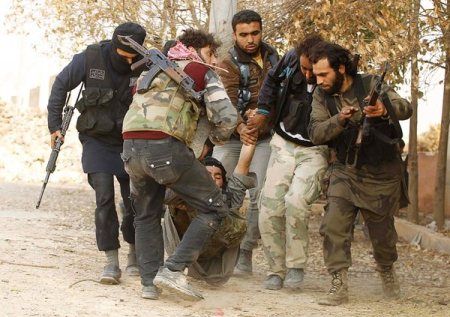Syrians on both sides predict President Assad’s winning

A growing number of Syrians on both sides of their country’s conflict, along with regional analysts and would-be mediators, are demanding new strategies to end the civil war, based on what they see as an inescapable new reality: President Bashar al-Assad is staying in office.
They say the insistence from the United States-backed opposition that Mr. Assad must go before peace talks can begin is outdated, failing to reflect the situation on the ground. Rather, they say, a deal to end or ease the violence must involve Mr. Assad and requires more energetic outreach to members of his government and security forces, with concrete proposals and reassurances that could bring compromise.
They also contend that the American-backed exile opposition coalition that remains at the center of Washington’s policy has little relevance and no respect from combatants on either side. These critics of American policy say that the United States and its coalition ally are helping guarantee that diplomacy remains paralyzed as Syrians die.
On Friday, the exile coalition declared it would not attend a meeting in Moscow that would have brought it together with Syrian government officials for the first time, albeit to focus narrowly on addressing Syria’s deepening humanitarian crisis.
The critics say there is no indication that Mr. Assad is headed for imminent defeat; indeed, he seems to be increasing his grip on parts of the country. So they are reluctantly embracing a scaled-down goal of a transitional government.
The best hope, they say, is to gradually blunt the violence in a Syria that will long remain divided among areas dominated by jihadist fighters, more-moderate elements of the opposition and a transitional government.
Changing course is urgent, the critics say, because as the prospects for the peace talks in Geneva recede, Syria is falling apart. In the north, extremist jihadist groups are terrorizing residents, clashing with rival rebels and establishing a base that poses threats beyond Syria’s borders. Hunger and disease are on the rise. Polio is resurgent. More than nine million Syrians have been displaced from their homes, the equivalent, by percentage of the population, of more than 100 million Americans on the move.
In interviews on opposite ends of West Beirut in recent days, two Syrians from opposite sides of the conflict — an antigovernment activist married to an opposition commander and a government supporter with ties to members of the security establishment — expressed similar feelings: a passionate love of Syria and a desire to end the destruction and killing.
In a separate context, others are stepping into the vacuum. Russia is moving forward with plans to host the meeting in Moscow with a broader array of opposition figures — some of them controversial — than just the coalition.
In a sign that the Obama administration’s strategy may be shifting, however, a spokeswoman for the exile opposition group, the Syrian National Coalition, Bayan al-Khatib, said Wednesday that American officials had encouraged the coalition to attend, and that some members were considering it. They were apparently overruled.
Other quiet attempts are being made to set up unofficial talks, some with State Department backing. In one last month that did not involve the Americans, Abdullah al-Dardari, who was ousted from the Syrian government in 2011 and is now a United Nations official, held a meeting in Beirut of about 170 Syrians from opposing sides in the conflict.
The meeting, several participants said, included midlevel, technocratic government officials; religious and business figures; prominent members of the nonviolent opposition; and at least two opposition fighters from the Western-backed Free Syrian Army, one of whom boasted that he had shot down two helicopters. The official agenda was to discuss the eventual reconstruction of Syria, but the underlying goal was to seek common ground.
One participant described a coffee-break conversation between a woman who had been jailed for antigovernment political activities and a government supporter. Both considered their primary enemy to be the Islamic State in Iraq and Syria, a foreign-dominated jihadist organization.
The government supporter’s face brightened with surprise, the participant said, when the activist declared that given a choice between the government and the jihadists, she would choose the government — an increasingly common sentiment among civilian activists.
To numerous analysts and Syrian centrists, the best-case outlook now is a transitional government that includes Mr. Assad and opposition figures, a gradual process of change that includes a new constitution and transparent elections.
Source: Breaking News Network







